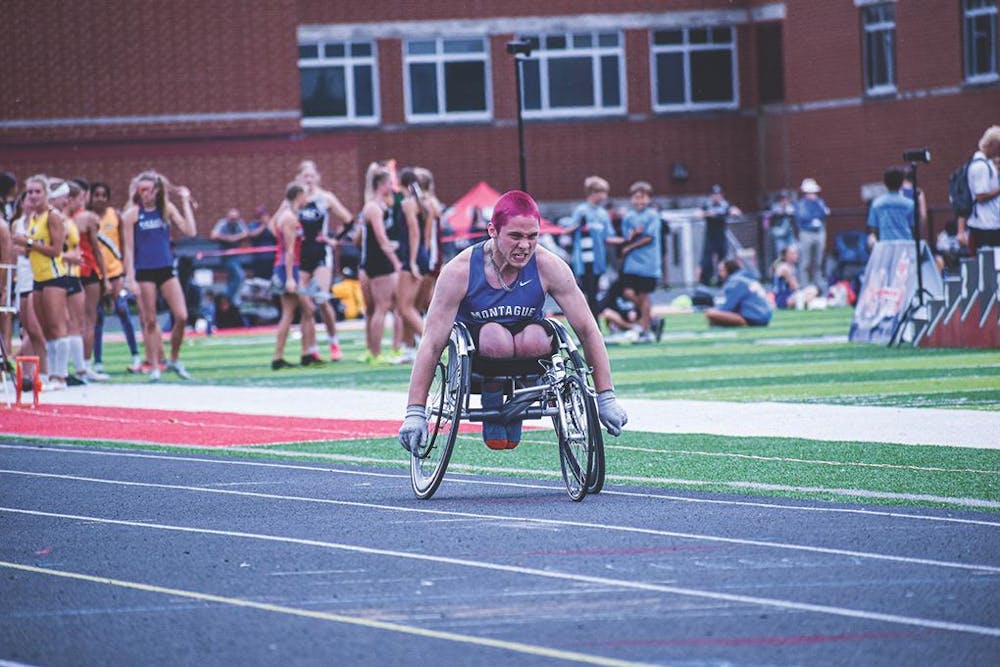MONTAGUE — Montague High School junior Wyatt Fairchild approached the head track coach, Joe Brunson prior to the season, saying he wanted to join the track team. He is now the first adaptive track athlete to compete at Montague.
“It was kind of funny,” said Fairchild. “I told him I wanted to join track and nobody here has ever done that. We laughed about it and I said, ‘no, I seriously want to join track. I want to do this.’ He immediately said, ‘OK, let’s figure this out. Let’s do it.’ It was pretty easy for me to get started because he wanted to learn about it, so he could coach me. He was really open to the idea and it was really cool.”
Brunson has coached track and field for 10 seasons, with this being his second season as Montague coach. Despite his initial lack of knowledge in adaptive track, Brunson has a deep appreciation for Fairchild’s motivation and drive to better himself.
“As far as Wyatt being an adaptive track athlete, it’s all brand new,” Brunson said. “Once we got past the initial learning curve, it’s exciting to be doing something different and to have this opportunity to do it. Anytime I have somebody who just enjoys doing the event and wants to apply themselves and be the best they can be, I think that’s a big win.”
In the past, Fairchild has been part of an adaptive basketball team. He got the idea to join track from one of his adaptive basketball teammates, who does track as well.
“It’s been really nice,” said Fairchild. “It’s a really good way for me to get in some physical activity and also have a competitive mindset. It shows improvement very quickly. I can measure myself and watch myself get better.”
Due to the overall nature of track and field, and many different events that happen in one meet, Fairchild has had to do a lot of practicing and learning on his own. Brunson admires his ability to be responsible and independent at practices.
“He’s had to be very proactive and take the initiative himself because I’m kind of all over the place,” Brunson said. “That’s just the nature of track and field. There are a lot of events that overlap and there’s also a lot of events that are vastly different. Since Wyatt has joined us, we haven’t had somebody dedicated to what he’s doing. We don’t have a background in that either. It’s been a process, trying to figure out whatever we need to do for him, and take some of the principles from track runners and apply it to his wheelchair training. I have a conversation with him every day, but he has to take the initiative and do it on his own to some extent. It’s good that he’s so motivated. As a coach, I need that in my athletes, not just for competitive purposes, but also for practices and organization purposes.”
Despite Fairchild being the only adaptive track athlete at Montague, he appreciates the support he gets from his teammates everyday.
“They’re very supportive,” said Fairchild. “Everybody’s been cheering me on. It’s been really supportive and a lot less scary than I thought it was going to be. I thought it would be kind of lonely because nobody else is doing adaptive track and I’m the first one to do it. I thought nobody would really understand it, but it’s not that way at all. My team pushes me, I push myself and everybody’s been there to support me.”
With Fairchild being one of the few adaptive track athletes in the area, he has been competing in heats with regular track runners at meets.
“We don’t know what the other competition is like,” Brunson said. “He has a good chance to compete at state and hopefully he’ll have some competition there. We’ve had him in the same heat with runners, but when he starts out, it’s way more difficult to get a wheelchair going than it is to start running. But once he gets his acceleration going, some of the runners finish not too much farther ahead of him. It’s been great to see the support from the team and other fans, and hopefully that will continue and there will be some excitement for it.”
Fairchild did not end up having any competition at state, racing by himself in a 400-meter heat. He earned a time of 1:26.9. His personal best time this year was 1:22.3 at the all-star meet May 22.
Fairchild hopes this can be a learning experience for everyone and hopes to encourage other people with disabilities to try something new.
“I hope this can be an eye-opener for other people because people weren’t meant to be stationary,” said Fairchild. “We weren’t meant to sit around and it shouldn’t be that way for people with disabilities either. It’s been great for my mental health, it’s been great for my physical health and it’s just been a great experience so far.”











